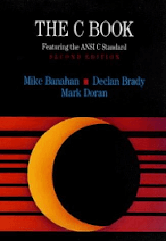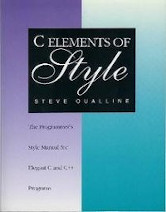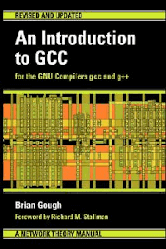Last Updated on June 3, 2025
C is a general-purpose, procedural, portable, high-level programming language that is one of the most popular and influential languages. It was designed to be compiled using a straightforward compiler, to provide low-level access to memory, to provide language constructs that map efficiently to machine instructions, and to require minimal run-time support. Many programming languages owe a considerable debt to C. It has become something of the lingua franca in the programming world.
C is fairly simple to understand. It allows the programmer to organize programs in a clear, easy, logical way. It is a very flexible, practical and compact language combined with an easy to read syntax. Code written in C runs quickly, with easy access to the low level facilities in the computer. Compiler directives make it possible to produce a single version of a program compiled for different architectures.
C is about freedom. It therefore makes sense to learn C with books that also embody freedom. Take a look at my picks and see if any of them grab your fancy.
1. The C Book by Mike Banahan, Declan Brady and Mark Doran
 The C Book is designed for programmers who already have some experience of using a modern high-level procedural programming language.
The C Book is designed for programmers who already have some experience of using a modern high-level procedural programming language.
You should already understand statements, variables, conditional execution, arrays, procedures (or subroutines) and so on.
The book concentrates on the things that are special to C. In particular, it is the way that C is used which is focused on. The book is both informative and a good read.
Chapters include:
- An Introduction to C
- Variables and Arithmetic – introduces some of the fundamentals of C, including keywords and identifiers, declaration of variables, real types, integral types, expressions and arithmetic, and constants
- Control of Flow and Logical Expressions – looks at the various ways that the control of flow statements can be used in a C program, including some statements that have not been introduced so far. Control of flow, more logical expressions, and strange operators
- Functions – the type of functions, recursion and argument passing, and linkage
- Arrays and Pointers – arrays, pointers, character handling, sizeof and storage allocation, pointers to functions, expressions involving pointers, arrays, the & operator and function declarations
- Structured Data Types – structures, unions, bitfields, enums, qualifiers and derived types, and initialization
- The Preprocessor – how the preprocessor works, and directives
- Specialized Areas of C – declarations, definitions and accessibility, typedef, const and volatile, and sequence points
- Libraries – diagnostics, character handling, localization, limits, mathematical functions, non-local jumps, signal handling, variable numbers of arguments, input and output, formatted I/O, character I/O, unformatted I/O, random access functions, general utilities, string handling, and date and time
- Complete Programs in C – putting it all together, arguments to main, interpreting program arguments, a pattern matching program, and a more ambitious example
The authors give the reader permission to do anything they want with the book provided there is an acknowledgement of the authors and their copyright. From what Mike Banahan has confirmed, the book is effectively under the Creative Commons License.
2. C Elements of Style by Steve Oualline
 C Elements of Style is a useful guide which covers the principals of good programming style, teaching C and C++ programmers how to write code that can be easily read, understood, and maintained by others. Whether you are a student or professional programmer, you will benefit from the many tips and techniques for constructing elegant, reliable code.
C Elements of Style is a useful guide which covers the principals of good programming style, teaching C and C++ programmers how to write code that can be easily read, understood, and maintained by others. Whether you are a student or professional programmer, you will benefit from the many tips and techniques for constructing elegant, reliable code.
The book attempts to show readers how to build a good programming style into your code. Since computer reads only the code and the human concentrates on the comments, a good programming style pertains to both parts of a program.
The ultimate goal is to build a well-designed, well-written code which not only make an effective use of the computer and but also contains careful constructed comments to help humans understand it. This condition will ease the debugging, maintenance and enhancement process, which will eventually improve the readability, portability, reliability and maintainability of your code.
Inside, you will find guidelines on writing comments, program heading, determining variable names, statement formatting, statement details, writing preprocessor, organizing directories and creating makefile.
This book is published under the Creative Commons License.
3. An Introduction to GCC by Brian Gough
 An Introduction to GCC provides an introduction to the GNU C and C++ Compilers, gcc and g++, which are part of the GNU Compiler Collection (GCC).
An Introduction to GCC provides an introduction to the GNU C and C++ Compilers, gcc and g++, which are part of the GNU Compiler Collection (GCC).
After reading this book, you’ll know how to compile a program, use basic compiler options for optimization and debugging.
This book explains how to use the compiler itself. Based on years of observation of questions posted on mailing lists, it guides the reader straight to the important options of GCC. The book doesn’t teach C.
Chapters:
- Introduction
- Compiling a C program – describes how to compile C programs using gcc. Programs can be compiled from a single source file or from multiple source files, and may use system libraries and header files
- Compilation options – describes other commonly-used compiler options available in GCC. These options control features such as the search paths used for locating libraries and include files, the use of additional warnings and diagnostics, preprocessor macros and C language dialects
- Using the preprocessor – describes the use of the GNU C preprocessor cpp, which is part of the GCC package. The preprocessor expands macros in source files before they are compiled. It is automatically called whenever GCC processes a C or C++ program
- Compiling for debugging – provides the -g debug option to store additional debugging information in object files and executables. This debugging information allows errors to be traced back from a specific machine instruction to the corresponding line in the original source file
- Compiling with optimization – GCC is an optimizing compiler. It provides a wide range of options which aim to increase the speed, or reduce the size, of the executable files it generates
- Compiling a C++ program – describes how to use GCC to compile programs written in C++, and the command-line options specific to that language
- Platform-specific options – describes some of the options available for common platforms: Intel and AMD x86 options, x86 extensions, x86 64-bit processors, DEC Alpha options, SPARC options, POWER/PowerPC options, Multi-architecture support, and floating-point issues
- Troubleshooting – GCC provides several help and diagnostic options to help troubleshoot problems with the compilation process
- Compiler-related tools – describes a number of tools which are useful in combination with GCC. These include the GNU archiver ar, for creating libraries, and the GNU profiling and coverage testing programs, gprof and gcov
- How the compiler works – describes in more detail how GCC transforms source files to an executable file. Compilation is a multi-stage process involving several tools, including the GNU Compiler itself (through the gcc or g++ frontends), the GNU Assembler as, and the GNU Linker ld. The complete set of tools used in the compilation process is referred to as a toolchain
- Examining compiled files – describes several useful tools for examining the contents of executable files and object files
- Common error messages – describes the most frequent error and warning messages produced by gcc and g++. Each case is accompanied by a description of the causes, an example and suggestions of possible solutions
- Getting help – if readers encounters a problem not covered by this introduction, there are several reference manuals which describe GCC and language-related topics in more detail
This book is published under the GNU Free Documentation License.
Next page: Page 2 – An Introduction to C & GUI and more books
Pages in this article:
Page 1 – The C Book and more books
Page 2 – An Introduction to C & GUI Programming and more books
Page 3 – The GNU C Reference Manual and more books
Page 4 – Essential C and more books
Page 5 – Beej’s Guide to Network Programming and more books
All books in this series:
| Free Programming Books | |
|---|---|
| Ada | ALGOL-like programming language, extended from Pascal and other languages |
| Agda | Dependently typed functional language based on intuitionistic Type Theory |
| Arduino | Inexpensive, flexible, open source microcontroller platform |
| Assembly | As close to writing machine code without writing in pure hexadecimal |
| Awk | Versatile language designed for pattern scanning and processing language |
| Bash | Shell and command language; popular both as a shell and a scripting language |
| BASIC | Beginner’s All-purpose Symbolic Instruction Code |
| C | General-purpose, procedural, portable, high-level language |
| C++ | General-purpose, portable, free-form, multi-paradigm language |
| C# | Combines the power and flexibility of C++ with the simplicity of Visual Basic |
| Clojure | Dialect of the Lisp programming language |
| ClojureScript | Compiler for Clojure that targets JavaScript |
| COBOL | Common Business-Oriented Language |
| CoffeeScript | Transcompiles into JavaScript inspired by Ruby, Python and Haskell |
| Coq | Dependently typed language similar to Agda, Idris, F* and others |
| Crystal | General-purpose, concurrent, multi-paradigm, object-oriented language |
| CSS | CSS (Cascading Style Sheets) specifies a web page’s appearance |
| D | General-purpose systems programming language with a C-like syntax |
| Dart | Client-optimized language for fast apps on multiple platforms |
| Dylan | Multi-paradigm language supporting functional and object-oriented coding |
| ECMAScript | Best known as the language embedded in web browsers |
| Eiffel | Object-oriented language designed by Bertrand Meyer |
| Elixir | Relatively new functional language running on the Erlang virtual machine |
| Erlang | General-purpose, concurrent, declarative, functional language |
| F# | Uses functional, imperative, and object-oriented programming methods |
| Factor | Dynamic stack-based programming language |
| Forth | Imperative stack-based programming language |
| Fortran | The first high-level language, using the first compiler |
| Go | Compiled, statically typed programming language |
| Groovy | Powerful, optionally typed and dynamic language |
| Haskell | Standardized, general-purpose, polymorphically, statically typed language |
| HTML | HyperText Markup Language |
| Icon | Wide variety of features for processing and presenting symbolic data |
| J | Array programming language based primarily on APL |
| Java | General-purpose, concurrent, class-based, object-oriented, high-level language |
| JavaScript | Interpreted, prototype-based, scripting language |
| Julia | High-level, high-performance language for technical computing |
| Kotlin | More modern version of Java |
| LabVIEW | Designed to enable domain experts to build power systems quickly |
| LaTeX | Professional document preparation system and document markup language |
| Lisp | Unique features - excellent to study programming constructs |
| Logo | Dialect of Lisp that features interactivity, modularity, extensibility |
| Lua | Designed as an embeddable scripting language |
| Markdown | Plain text formatting syntax designed to be easy-to-read and easy-to-write |
| Objective-C | Object-oriented language that adds Smalltalk-style messaging to C |
| OCaml | The main implementation of the Caml language |
| Pascal | Imperative and procedural language designed in the late 1960s |
| Perl | High-level, general-purpose, interpreted, scripting, dynamic language |
| PHP | PHP has been at the helm of the web for many years |
| PostScript | Interpreted, stack-based and Turing complete language |
| Prolog | A general purpose, declarative, logic programming language |
| PureScript | Small strongly, statically typed language compiling to JavaScript |
| Python | General-purpose, structured, powerful language |
| QML | Hierarchical declarative language for user interface layout - JSON-like syntax |
| R | De facto standard among statisticians and data analysts |
| Racket | General-purpose, object-oriented, multi-paradigm, functional language |
| Raku | Member of the Perl family of programming languages |
| Ruby | General purpose, scripting, structured, flexible, fully object-oriented language |
| Rust | Ideal for systems, embedded, and other performance critical code |
| Scala | Modern, object-functional, multi-paradigm, Java-based language |
| Scheme | A general-purpose, functional language descended from Lisp and Algol |
| Scratch | Visual programming language designed for 8-16 year-old children |
| SQL | Access and manipulate data held in a relational database management system |
| Standard ML | General-purpose functional language characterized as "Lisp with types" |
| Swift | Powerful and intuitive general-purpose programming language |
| Tcl | Dynamic language based on concepts of Lisp, C, and Unix shells |
| TeX | Markup and programming language - create professional quality typeset text |
| TypeScript | Strict syntactical superset of JavaScript adding optional static typing |
| Vala | Object-oriented language, syntactically similar to C# |
| VHDL | Hardware description language used in electronic design automation |
| VimL | Powerful scripting language of the Vim editor |
| XML | Rules for defining semantic tags describing structure ad meaning |
